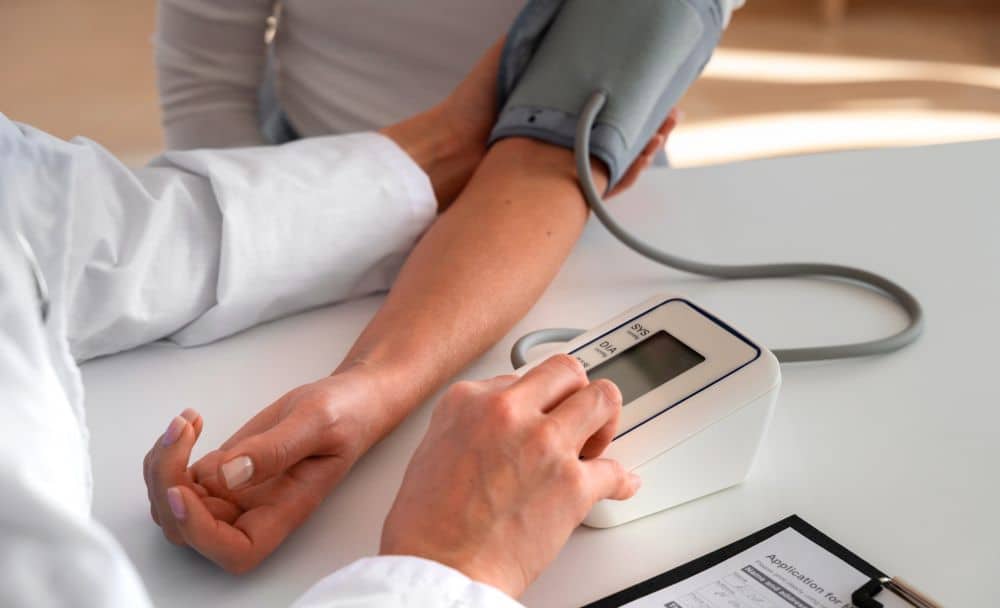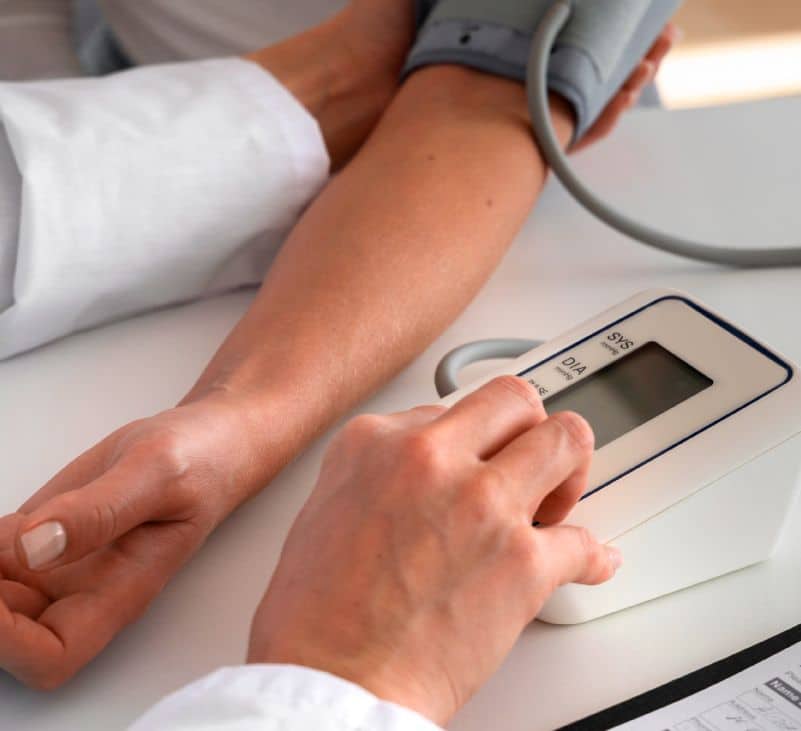
High blood pressure, commonly known as hypertension, is a prevalent health concern affecting millions worldwide. Often called the “silent killer,” hypertension goes unnoticed until it leads to severe complications like heart disease, stroke, or kidney problems.
While most of us know the general concept of high blood pressure, it is vital to understand that not all cases are identical. There are different types of hypertension, each with distinct characteristics and underlying causes.
In this article, we explore hypertension and its types. We hope to enhance your understanding of this complex condition, empowering you with the knowledge that can contribute to better management and prevention.
What is hypertension?
Hypertension is a chronic medical condition that happens due to elevated pressure in the arteries. It occurs when the force exerted by blood against the blood vessels is usually higher than average. Think of it as your blood pushing a little too hard against the pipes of your circulatory system.
Now, why does it matter? High blood pressure strains your heart, which has to work more to pump blood throughout your body. Over time, this increased workload can lead to heart disease, stroke, kidney problems, and even damage to other organs. [1]
What are the types of hypertension?
Hypertension is of two main types: primary hypertension and secondary hypertension. Let’s take a closer look at hypertension types and explore the underlying medical conditions that may contribute to it.
- Primary hypertension
Primary hypertension accounts for the majority of the cases. It develops gradually over time and is not linked to any specific underlying medical condition. Primary hypertension often results from a family history of hypertension, advancing age, obesity, a sedentary lifestyle, poor dietary habits, excessive alcohol consumption, and chronic stress. [2]
- Secondary hypertension
Secondary hypertension is due to an underlying medical condition. Unlike primary hypertension, secondary typically has a specific cause. This type accounts for a smaller proportion of hypertension cases but requires attention and proper management.
Secondary hypertension can arise from sleep problems, blocked renal arteries in the kidneys, and exceptional levels of hormones controlling blood pressure. These factors affect the kidneys, arteries, heart, or endocrine system. [2]
What are the causes of hypertension?
Let’s explore the critical causes of hypertension and understand how various lifestyle choices and health conditions can contribute to its development.
- Unhealthy lifestyle choices
Not engaging in regular physical activity and leading a sedentary life can increase the risk of hypertension. Physical activity helps keep the cardiovascular system healthy and promotes optimal blood pressure levels. [1]
- Health conditions
Individuals with diabetes hold higher risk of developing high blood pressure. Additionally, obesity itself is a risk factor for hypertension. Excess weight strains the heart and blood vessels, increasing blood pressure. [1]

- Pregnancy
Hypertension can also occur during pregnancy, leading to a condition known as gestational hypertension. It requires monitoring and management to minimize risks for the mother and the baby. [1]
What are the symptoms of hypertension?
Let’s explore the symptoms of hypertension and emphasize the importance of regular blood pressure monitoring for early detection.
- Absence of symptoms
Most people with hypertension do not feel symptoms, especially in the early stages. It thus becomes challenging to recognize the condition without proper medical evaluation. Therefore, it is crucial to prioritize routine blood pressure checks to identify abnormal readings.
- Symptoms of severe hypertension
In rare cases, when blood pressure reaches exceptionally high levels, individuals may experience symptoms that require immediate medical attention. The symptoms can be headaches, blurred vision, chest pain, shortness of breath, and more. However, these symptoms are not exclusive to hypertension and can be associated with other health conditions. [1]
Regular blood pressure monitoring is the most effective way to detect high blood pressure. By checking your blood pressure regularly, either at home or during routine medical check-ups, you can identify any changes or abnormalities and seek appropriate medical guidance.
What is the Ayurvedic treatment for hypertension?
It is essential to consider the Prasara Avastha (state of imbalance) of the Tridosha (three fundamental energies) and the Rasa (plasma), Rakta (blood), and Meda (fat) imbalances. Alongside lifestyle modifications, a suitable approach may involve Vata Anulomana (facilitating the normal movement of Vata), Tridoshahara (balancing all three doshas), and therapies that promote Rasa and Rakta Prasadana (purification of plasma and blood), as well as Medohara (reducing excess fat). [3]
Ayurvedic medications to overcome Hypertension
While there are several medications available to manage hypertension, Zandu comes across as a reliable option due to its rich legacy and heritage. Its range of metabolism booster supplements are backed by scientific research and aid in overcoming hypertension. These supplements are crafted using natural ingredients and centuries-old Ayurvedic wisdom.
For example, Zandu Arjuna Capsules is an Ayurvedic formulation that helps maintain a healthy heart while keeping cholesterol and diabetes in check. Zandu Karela Pure capsules contain pure Karela extracts, which regulate blood sugar levels naturally. Zandu Methi Pure Herb is an Ayurvedic remedy backed by extensive research, providing additional support in managing hypertension.
These supplements harness the power of natural ingredients and Ayurvedic wisdom to help individuals on their journey towards better cardiovascular health.
FAQs
- What are the types of portal hypertension?
Portal hypertension has three main types: prehepatic, intrahepatic, and posthepatic portal hypertension.
- What are Type 1 and Type 2 hypertension?
Hypertension is generally primary or secondary hypertension. Primary hypertension comes without an identifiable cause, while secondary one results from an underlying medical condition.
- What is the main cause of hypertension?
Hypertension is often due to genetic, lifestyle, and environmental factors. Secondary hypertension can be because of underlying medical conditions such as kidney disease.
- How to reduce hypertension?
Reducing hypertension involves adopting a holistic approach. Some effective strategies include:
- Maintaining a healthy weight through regular exercise
- Eating a balanced diet with less sodium and more fruits, vegetables, and whole grains.
- Limiting alcohol consumption and avoiding smoking.
- Managing stress through meditation.
- Taking prescribed medications, if necessary, as directed by a healthcare professional.
- Regularly monitoring blood pressure and attending regular check-ups with a healthcare provider.
- Consulting with a healthcare professional for personalized guidance and recommendations.
Conclusion
Understanding the different types of hypertension is crucial for effectively managing this health condition. Regular blood pressure monitoring and consultations with healthcare professionals are essential for early detection and effective management of hypertension. Understanding the unique characteristics of each type of hypertension will help you make informed decisions about your health and work towards maintaining optimal blood pressure levels.
Disclaimer: The information provided here is not intended to replace professional advice or treatment.





















